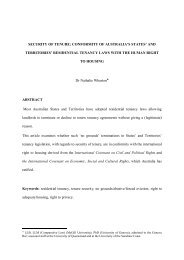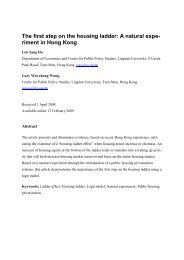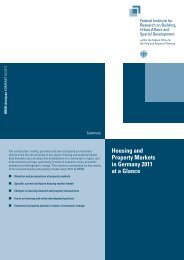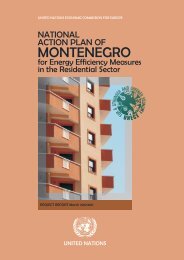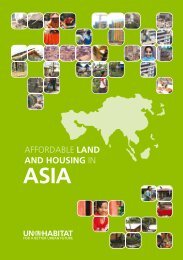housing developments in european countries - Department of ...
housing developments in european countries - Department of ...
housing developments in european countries - Department of ...
Create successful ePaper yourself
Turn your PDF publications into a flip-book with our unique Google optimized e-Paper software.
Section 4<br />
Outcomes<br />
Outcomes Section 4<br />
Table 4.6.1<br />
Disequilibrat<strong>in</strong>g Factors <strong>in</strong> Hous<strong>in</strong>g Markets <strong>in</strong> European Countries up to 2004<br />
Country<br />
Disequilibrat<strong>in</strong>g Factors<br />
Ireland<br />
Problems <strong>of</strong> high <strong>in</strong>flation and shortage <strong>of</strong> skills<br />
Malta<br />
Shortage <strong>of</strong> land for development and a limited use<br />
Slovenia<br />
F<strong>in</strong>anc<strong>in</strong>g <strong>of</strong> construction and <strong>in</strong>adequate supply <strong>of</strong><br />
Austria<br />
Reduced central government subsidies towards local<br />
government supports for house build<strong>in</strong>g and<br />
refurbishment may reduce supply and <strong>in</strong>crease prices.<br />
with<strong>in</strong> the construction <strong>in</strong>dustry, although these<br />
have abated somewhat <strong>in</strong> 2002 and 2003,<br />
shortage <strong>of</strong> serviced build<strong>in</strong>g land <strong>in</strong> high demand<br />
areas.<br />
<strong>of</strong> high-rise construction. There are high levels <strong>of</strong><br />
vacant and dilapidated properties which are not<br />
available for use by those <strong>in</strong> need <strong>of</strong> <strong>hous<strong>in</strong>g</strong>.<br />
Although rent control legislation has been liberalised,<br />
Spa<strong>in</strong><br />
serviced build<strong>in</strong>g land, particularly <strong>in</strong> urban areas, are<br />
ma<strong>in</strong> problems here.<br />
Limited supply <strong>of</strong> build<strong>in</strong>g land <strong>in</strong> cities where<br />
Bulgaria<br />
Low household <strong>in</strong>comes mean that demand for<br />
<strong>hous<strong>in</strong>g</strong> is not supported by purchas<strong>in</strong>g power and<br />
consequently supply is low.<br />
Italy<br />
Supply <strong>of</strong> rental accommodation is <strong>in</strong>sufficient to<br />
meet core demand. In addition, this core demand<br />
is supplemented by atypical demand – from<br />
Netherlands<br />
the rema<strong>in</strong><strong>in</strong>g provisions <strong>in</strong> this regard are still<br />
distort<strong>in</strong>g the market.<br />
Economic stagnation has made consumers unwill<strong>in</strong>g<br />
Sweden<br />
demand is highest.<br />
Low rate <strong>of</strong> <strong>hous<strong>in</strong>g</strong> output <strong>in</strong> areas <strong>of</strong> high demand.<br />
This is the result <strong>of</strong>: lack <strong>of</strong> appropriately located<br />
Cyprus<br />
Cont<strong>in</strong>ually ris<strong>in</strong>g construction cost is due to the<br />
general ris<strong>in</strong>g cost <strong>of</strong> land, materials, petrol, lack <strong>of</strong><br />
availability <strong>of</strong> labour.<br />
immigrants, students, non-resident workers and<br />
tourists – which gives rise to speculative behaviour<br />
on the part <strong>of</strong> <strong>in</strong>vestors <strong>in</strong> this market and means<br />
that dwell<strong>in</strong>gs are not available to meet core<br />
to <strong>in</strong>vest <strong>in</strong> <strong>hous<strong>in</strong>g</strong>. Therefore sell<strong>in</strong>g and buy<strong>in</strong>g<br />
dwell<strong>in</strong>gs <strong>in</strong> the more expensive segment <strong>of</strong> the<br />
market has become more difficult. This has led to a<br />
lack <strong>of</strong> mobility <strong>in</strong> the <strong>hous<strong>in</strong>g</strong> market which has<br />
land, high costs <strong>of</strong> production, impediments related<br />
to the plann<strong>in</strong>g system <strong>in</strong>clud<strong>in</strong>g the level <strong>of</strong> appeals<br />
and unwill<strong>in</strong>gness among some local authorities to<br />
<strong>in</strong>crease the local population for fear <strong>of</strong> ris<strong>in</strong>g costs<br />
Czech Republic<br />
Denmark<br />
Estonia<br />
F<strong>in</strong>land<br />
France<br />
Lack <strong>of</strong> private sector <strong>in</strong>volvement <strong>in</strong> the construction<br />
<strong>of</strong> rental <strong>hous<strong>in</strong>g</strong> is due to the long period <strong>of</strong> return<br />
on <strong>in</strong>vestment <strong>in</strong> this sector compared to owneroccupied<br />
dwell<strong>in</strong>gs. This is compounded by the<br />
impact <strong>of</strong> rent control measures which have affected<br />
an unbalanced distribution <strong>of</strong> the rights between<br />
landlords and tenants and also by shortcom<strong>in</strong>gs <strong>in</strong><br />
government measures <strong>in</strong>tended to support <strong>hous<strong>in</strong>g</strong><br />
construction.<br />
Rent control <strong>in</strong>hibits mobility <strong>in</strong> the <strong>hous<strong>in</strong>g</strong> market<br />
and discourages the construction <strong>of</strong> private rented<br />
dwell<strong>in</strong>gs.<br />
Impact <strong>of</strong> the plann<strong>in</strong>g process, particularly <strong>in</strong> rural<br />
areas, means that the build<strong>in</strong>g process is quite a<br />
time-consum<strong>in</strong>g activity.<br />
A low <strong>in</strong>terest rate environment drives demand for<br />
owner-occupied <strong>hous<strong>in</strong>g</strong>. Although this decreases<br />
pressure on the private rented market it also<br />
<strong>in</strong>creases land prices which can create difficulties for<br />
the construction <strong>of</strong> social rented <strong>hous<strong>in</strong>g</strong>. There is<br />
<strong>in</strong>sufficient development <strong>in</strong> some growth areas.<br />
Oversupply <strong>of</strong> social <strong>hous<strong>in</strong>g</strong> and <strong>of</strong> affordable<br />
private <strong>hous<strong>in</strong>g</strong> <strong>in</strong> some areas, and an under-supply<br />
<strong>in</strong> others. Also <strong>in</strong> some regions competition between<br />
demand for pr<strong>in</strong>cipal and secondary residences, has<br />
created affordability difficulties <strong>in</strong> the former sector.<br />
Latvia<br />
Lithuania<br />
demand. There are <strong>hous<strong>in</strong>g</strong> access problems<br />
among socially excluded sections <strong>of</strong> the<br />
population <strong>in</strong>clud<strong>in</strong>g: immigrants, the ‘new poor’<br />
<strong>in</strong>clud<strong>in</strong>g those <strong>in</strong> precarious employment, older<br />
people and s<strong>in</strong>gle people. Also, problems relat<strong>in</strong>g<br />
to the management <strong>of</strong> the State-subsidised<br />
<strong>hous<strong>in</strong>g</strong> stock. These <strong>in</strong>clude: <strong>in</strong>sufficient supply,<br />
particularly <strong>of</strong> accessible <strong>hous<strong>in</strong>g</strong> appropriate for<br />
older people and disabled people; overcrowd<strong>in</strong>g,<br />
low turnover <strong>of</strong> tenants, rent arrears, limited<br />
resources for management and <strong>in</strong>adequate<br />
ma<strong>in</strong>tenance <strong>of</strong> dwell<strong>in</strong>gs and estates.<br />
Low household <strong>in</strong>comes mean that demand for<br />
<strong>hous<strong>in</strong>g</strong> is not supported by purchas<strong>in</strong>g power.<br />
Also, construction <strong>of</strong> non-residential <strong>developments</strong><br />
rather than dwell<strong>in</strong>gs. Insufficiently<br />
developed f<strong>in</strong>ancial system and legislative<br />
arrangements.<br />
Sharp reduction <strong>in</strong> construction activity, due to a<br />
fall <strong>in</strong> direct fund<strong>in</strong>g by the State for this sector<br />
and the failure <strong>of</strong> the private sector to<br />
compensate for withdrawal <strong>of</strong> fund<strong>in</strong>g. Low<br />
average <strong>in</strong>comes mean demand is not supported<br />
by purchas<strong>in</strong>g power. The costs <strong>of</strong> new<br />
<strong>in</strong>frastructure are high. There is a limited supply <strong>of</strong><br />
development land and unresolved issues <strong>in</strong><br />
relation to land restitution. Local authorities are<br />
slow <strong>in</strong> prepar<strong>in</strong>g land use plann<strong>in</strong>g documents.<br />
Poland<br />
Portugal<br />
Romania<br />
impeded access by new households.<br />
Problems <strong>in</strong> access<strong>in</strong>g mortgage f<strong>in</strong>ance.<br />
A scarcity <strong>of</strong> build<strong>in</strong>g land and high land prices <strong>in</strong><br />
areas <strong>of</strong> high <strong>hous<strong>in</strong>g</strong> demand are problems here.<br />
There is excessive bureaucracy associated with<br />
construction.<br />
Problems are: the high cost <strong>of</strong> build<strong>in</strong>g materials,<br />
result<strong>in</strong>g from the monopolistic position <strong>of</strong> newly<br />
privatised and consolidated domestic producers,<br />
coupled with protection <strong>of</strong> the <strong>in</strong>ternal market by<br />
high tariffs on imported materials; <strong>in</strong>adequate supply<br />
<strong>of</strong> development land particularly <strong>in</strong> urban areas<br />
where demand is highest. This is the result <strong>of</strong>:<br />
unresolved restitution issues, <strong>in</strong>determ<strong>in</strong>ate<br />
ownership status <strong>of</strong> land; earlier high density<br />
development policies <strong>in</strong> urban areas; plann<strong>in</strong>g<br />
restrictions which impede the extension <strong>of</strong> exist<strong>in</strong>g<br />
urban areas, austerity budgets <strong>in</strong> local government<br />
which have created difficulties <strong>in</strong> servic<strong>in</strong>g land, and<br />
bureaucratic and lengthy procedures <strong>in</strong> the plann<strong>in</strong>g<br />
and build<strong>in</strong>g process, some <strong>of</strong> which entail high<br />
adm<strong>in</strong>istrative fees. In addition, the high cost <strong>of</strong><br />
f<strong>in</strong>ance for developers or build<strong>in</strong>g companies is an<br />
impediment to new <strong>developments</strong> as is the underdevelopment<br />
<strong>of</strong> the market <strong>in</strong> land and property, which<br />
is characterised by little competition, allegedly high<br />
pr<strong>of</strong>it marg<strong>in</strong>s and a suggestion that speculators may<br />
be hoard<strong>in</strong>g land to keep prices high.<br />
for municipal services. In addition, output <strong>of</strong><br />
apartment blocks both for rent and for owner<br />
occupation is a particular problem because it is also<br />
impeded by lack <strong>of</strong> <strong>in</strong>centives for the <strong>hous<strong>in</strong>g</strong><br />
companies to <strong>in</strong>vest <strong>in</strong> new production and<br />
<strong>in</strong>adequate plann<strong>in</strong>g by local authorities.<br />
Turkey<br />
Many difficulties aris<strong>in</strong>g from recently adopted<br />
procurement legislation such as the need for a very<br />
lengthy bidd<strong>in</strong>g process. In addition, lack <strong>of</strong> f<strong>in</strong>ance<br />
has impeded both public and private sector<br />
construction as has the shortage <strong>of</strong> land for<br />
construction. There is a lack <strong>of</strong> availability <strong>of</strong><br />
mortgage loans and f<strong>in</strong>ance for <strong>hous<strong>in</strong>g</strong> developers.<br />
United K<strong>in</strong>gdom Shortage <strong>of</strong> skilled workers <strong>in</strong> the construction<br />
<strong>in</strong>dustry, particularly <strong>in</strong> the home build<strong>in</strong>g sector.<br />
Note: <strong>in</strong>formation is not available for Belgium and Greece.<br />
Germany<br />
Hungary<br />
Increases <strong>in</strong> the price <strong>of</strong> build<strong>in</strong>g land, particularly <strong>in</strong><br />
the west <strong>of</strong> the country.<br />
Limited mobility among exist<strong>in</strong>g home owners. Low<br />
average <strong>in</strong>comes mean that demand is not supported<br />
by purchas<strong>in</strong>g power.<br />
Luxembourg<br />
Demand is be<strong>in</strong>g driven up by population growth<br />
and ris<strong>in</strong>g number <strong>of</strong> households. Supply has been<br />
stymied by the high price <strong>of</strong> build<strong>in</strong>g land and<br />
high construction costs. In addition, more and<br />
more households are encounter<strong>in</strong>g difficulties <strong>in</strong><br />
secur<strong>in</strong>g the f<strong>in</strong>ance for new build<strong>in</strong>gs.<br />
Slovakia<br />
Low household <strong>in</strong>comes mean that demand is not<br />
supported by purchas<strong>in</strong>g power. There is limited<br />
availability <strong>of</strong> serviced build<strong>in</strong>g land <strong>in</strong> high demand<br />
areas, <strong>in</strong>determ<strong>in</strong>ate ownership status <strong>of</strong> land;<br />
<strong>in</strong>sufficient supply <strong>of</strong> less expensive dwell<strong>in</strong>gs<br />
suitable for first-time buyers and older people.<br />
148 European Union Report<br />
Regular National Report on Hous<strong>in</strong>g Developments <strong>in</strong> European Countries<br />
149




